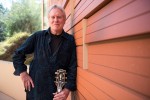Ennis Harris said the new global jazz major has taught him how to combine different genres of music.
For example, he has learned about the intersection of traditional jazz and Syrian folk music, said Harris, a third-year global jazz student.
The UCLA Herb Alpert School of Music launched the global jazz studies major in fall 2018. Under the new major, students learn about musical techniques from around the world, jazz history and the blending of jazz with music from other cultures. Previously, jazz studies fell under the ethnomusicology department.
Steven Loza, the global jazz studies department chair, said the program focuses on different styles and interpretations of jazz around the world and how they intersect. Loza added he believes the emphasis on global jazz enhances students’ musicality and jazz technique.
“If you hear scales from around the world, … you’re going to become a better musician,” Loza said. “You are also going to understand better about the world and where you can take your music.”
Harris added he felt exposure to jazz from different cultures helped his development as a musician.
“It kind of just unlocked new doors for me in terms of the way I think and the way I approach music,” Harris said.
Loza said he thinks the focus on global jazz sets the UCLA program apart from jazz programs offered at other universities and conservatories.
“A lot of the jazz studies programs … focus on jazz from the late ’40s and early ’50s to present, and especially on the bebop era,” Loza said. “That’s not all there is to jazz.”
Wolf Marshall, a lecturer and guitar instructor for the global jazz studies program, said he hopes the major will transform students into jazz artists, educators and performers.
“We groom (students) with real-world playing experience, married to necessary theory and the necessary vocational studies,” Marshall said. “It’s really well balanced in terms of performing (and) private instruction with professionals.”
The program provides students with the opportunity to learn from professional jazz musicians. Marshall said he feels professionals offer unique insight into how students can find a place in the jazz scene.
“We have people who have performed with big names,” Marshall said. “It’s difficult to break into the business, but (students) get some sense of what to do through mentorship with people who have been through that.”
Grant Grech, a first-year global jazz studies student, said small class sizes in the program have allowed him to develop closer relationships with his professors.
“I think that’s what sets it apart from the bigger conservatories,” Grech said. “When class sizes are bigger, you don’t get as much attention.”
The program will also allow students to learn about different styles of jazz firsthand in other countries. Justo Almario, a lecturer for the global jazz studies program, said the program is developing relationships with universities in Mexico and the Czech Republic.
“It would be a two-way thing,” Almario said. “They would be learning a little more about the music culture (and) how to apply that music to jazz, and also they will be teaching, sharing what they know from here with other people.”
The department is still developing, as it is still looking to hire three new faculty members and an endowed chair. Nonetheless, Harris said he believes the program has been running smoothly.
“The administration is really good at communicating with the students what’s been going on,” Harris said. “The students have been kept informed … and have been invited to come to all the interviews.”
Harris added he hopes classes within the program would be scheduled more closely together in the future.
“A lot of our classes are spread throughout the day,” Harris said. “Tuesday through Thursday, I’ll be here until 10 or 11 p.m.”
Marshall said he feels the program offers students valuable opportunities to learn from professionals and gain performance experience.
“I’ve tried to impress from day one to take advantage of this because life is all about how much experience you get, … so going forward you carry a wealth of knowledge and a wealth of ideas with you,” Marshall said.
